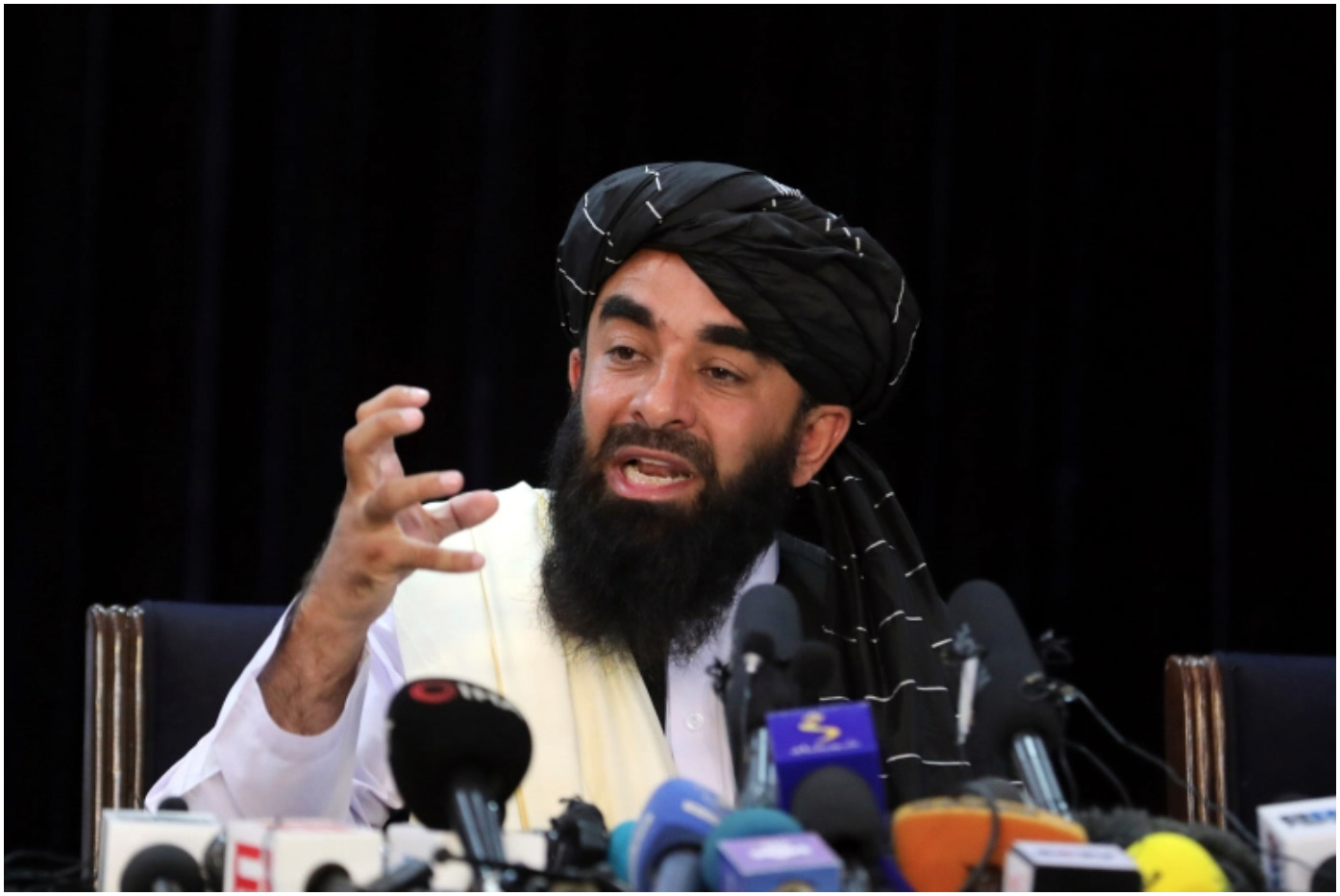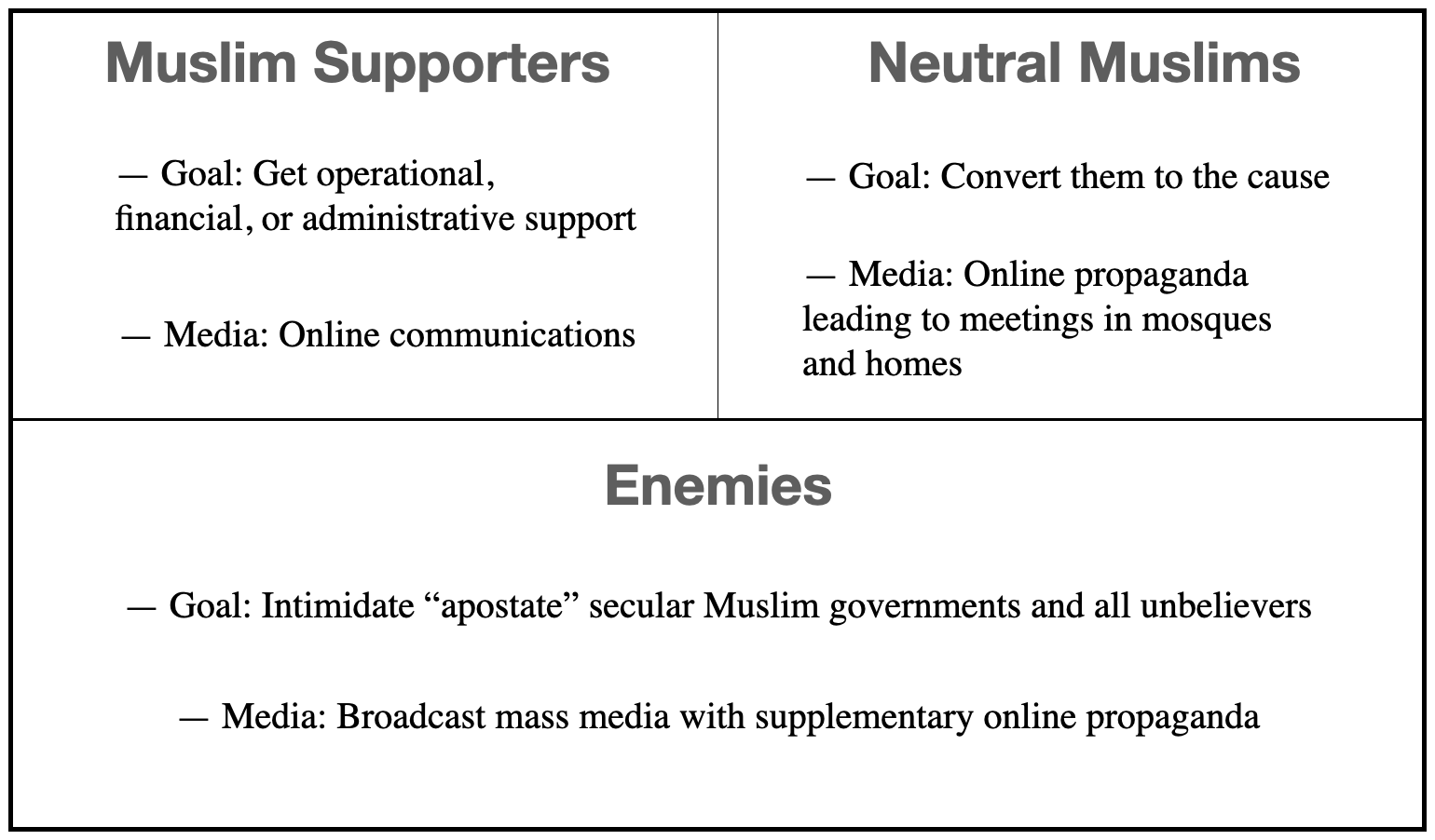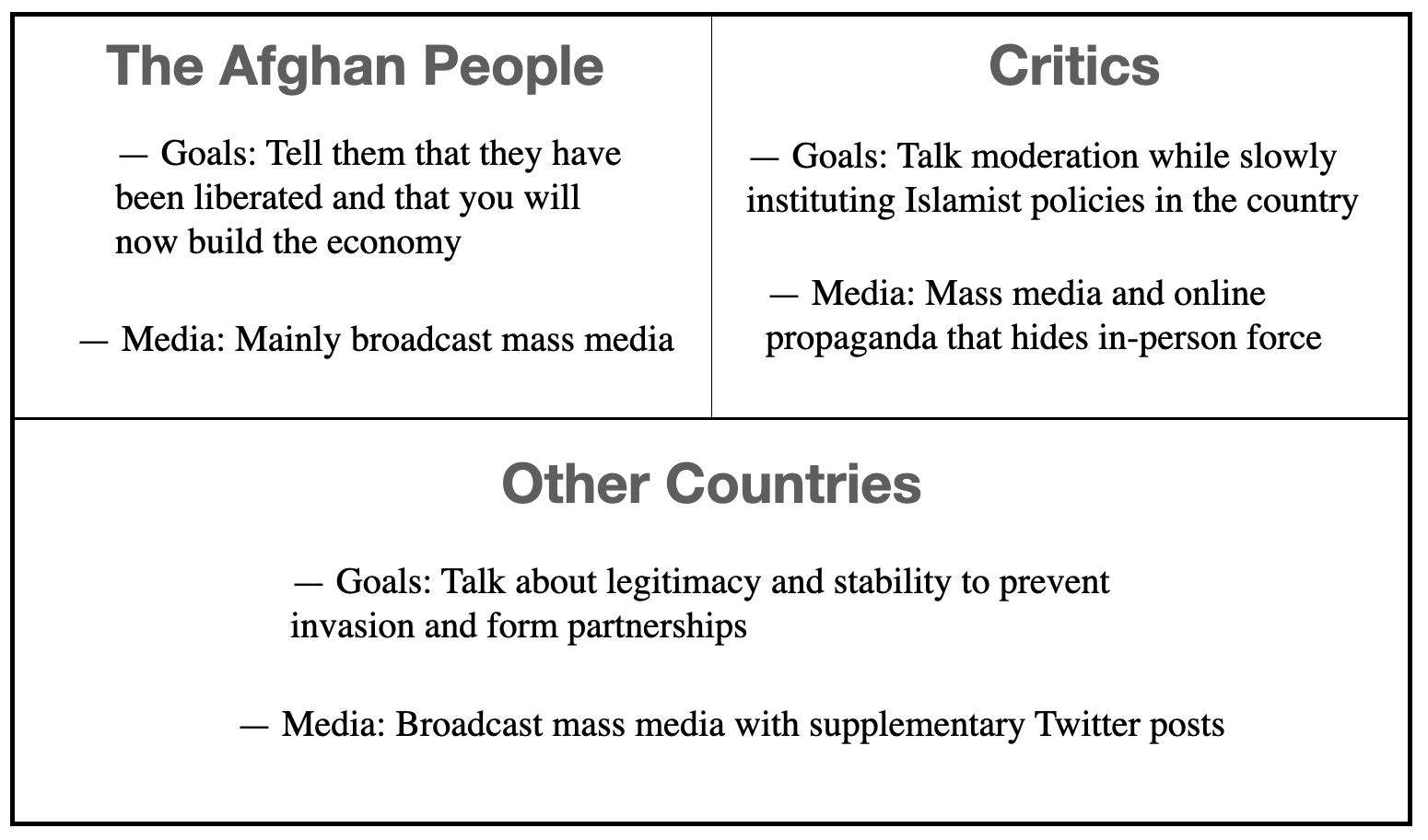The world has watched in horror as the Taliban conquered Afghanistan and defeated the US and NATO in a war that began after 9/11 and lasted two decades. In this extra edition of The Promotion Fix, I show the long-term PR strategy that all Islamists use and the new, short-term one that the Taliban has developed.
Do not let the Taliban’s new, reasonable demeanor fool you. It is a short-term change to hide the Islamist goals that the group has always had.
The communications goal of the Taliban and other Islamists is to grow their movements by spreading propaganda among Muslim and other audiences, according to a 2009 paper in the Partnership for Peace Consortium’s journal Connections.
The strategy to achieve that goal is to restructure the Islamic world’s political discourse and identity on a fundamental level. On a tactical level, the propaganda generally aims to establish social and religious viability, legitimize their violent actions against innocent civilians and intimidate both Muslim and non-Muslim opponents.
One common message is that the group is composed of freedom fighters who are forced to use violence to fight a ruthless oppressor. To them, they are like the Rebels in Star Wars, the West is like the Empire, and attacks such as 9/11 and 7/7 are like Luke blowing up the Death Star.
When the Taliban first ruled Afghanistan from 1996 to 2001, they used traditional broadcast mass media for their communications goals. After the US-led NATO alliance toppled the Taliban, they retreated to Pakistan and led an insurgency for two decades until they retook power last week.
During that time, the Taliban continued to spread their propaganda first through handwritten letters, DVDs, and then through online channels. Other Islamist groups such as Al Qaeda would also use blogs, the comment sections of news articles, and user-generated website content to spread their messages.
In 2006, the Taliban began publishing an online magazine entitled Al Somood (Standing Firm). In addition to the standard Islamic rhetoric, the International Crisis Group reported two years later that such media used alleged grievances such as the mistreatment of Taliban prisoners and NATO airstrikes that kill civilians to convert neutral Muslims to the cause.
In 2007 and 2008, the Taliban brought a Pakistani journalist to film the graduation ceremony of a group of suicide bombers and supplied video tapes of attacks on coalition forces to Al-Jazeera, which broadcasted them.
Over time, the Taliban — like many people in the marketing industry — moved more and more of their communications online out of operational necessity. (It is difficult to have a TV studio in a mountain cave.)
“The Internet is becoming increasingly important as a communication channel,” the 2009 Connections paper states. “It offers easy access, little or no regulation and censorship, potentially huge audiences, anonymity, and a rapid flow of information, all at relatively little expense. Jihadist terrorists have become extremely adept at exploiting the unique attributes of the Internet.”
Here is a basic chart that I created showing the general, historical media strategy of the Taliban and other Islamists in general. It is as logical as it is terrifying in the market segmentation and channel selection.
First, terrorist groups can use online and mobile platforms to tell someone to transfer money or detonate a bomb. Sure, these channels are often easily tracked and monitored, but the responses of police and security forces are often too late. This is, quite literally, activation.
Second, there is no better way to convert someone to a religious cause than for a friend to invite him to a meeting in person after prayer services. The real world is far more convincing than a computer screen. Further, it is easier to do this without raising the suspicions of the authorities.
Third, if you want to terrify the population of another country, have their TV news show your attacks and executions to their viewers. Mass media — especially when everyone knows that millions of other people are also watching — has usually been the best way to build a brand.
The end goal of most Islamists is to recreate the medieval Islamic caliphate. (To be fair, there are also extremist Christians who want to live in The Handmaid’s Tale and extremist Israelis who want a Jewish theocracy over a whole part of the Middle East.) And this has typically been their three-pronged PR plan.
Fast forward to 2021
Now, after the horrific news, what is the Taliban’s new PR plan?
After an army captures a city or another desired location, they will often stop, secure, and fortify the position before advancing onto the next target. (This was the US’ ‘island hopping’ strategy in the Pacific Ocean against Japan in the Second World War.) If an army moves ahead too quickly, it is easier for the enemy to take the prior cities back.
That is what the Taliban is doing. Of course, their long-term goal is still the caliphate. Now that they have taken Afghanistan again, they are securing and fortifying the country before continuing whatever plan they have in their crazy heads. And that securing and fortifying might take years.
The Taliban’s message to the world
First, the Taliban want security, legitimacy and help from the international world. They do not want anyone else to invade Afghanistan. That means no immediate militant Islamic declarations, no mass human rights abuses, and no disruptions to international order. They need to appear calm, reasonable and responsible.
In the Taliban’s first press conference, Taliban spokesperson Zabihullah Mujahid promised that foreign embassies would be secure and that no attacks will be planned in Afghanistan as when the Taliban sheltered Osama bin Laden two decades ago.
“I would like to assure our neighbours, regional countries, we are not going to allow our territory to be used against anybody, any country in the world,” he said. “So the whole global community should be assured that we are committed to these pledges that you will not be harmed in any way from our soil.”
Mujahid’s measured demeanor was likely also to show countries that a Taliban-led Afghanistan can be an effective partner. The Taliban and China might work together to extract the country’s estimated $1 trillion in minerals. Russia has spoken positively about the new government. The Taliban needs friends because more than $9 billion in aid to Afghanistan is now frozen.
Still, the most brazen rhetoric was to use the West’s tolerance and liberalism to justify the Taliban’s intolerant and illiberal beliefs.
“Other countries also have different rules, different policies, different viewpoints, different approaches and policies they use and different rules and regulations,” Mujahid said. “In the same way, Afghans also have the right to have their own rules and regulations and policies.”
It would be genius if it were not evil. I am tempted to wonder whether the Taliban took a messaging course online from the AMA in the US or the IPA in the UK while hiding out in the mountains of Pakistan.
The Taliban’s message to Afghanistan
Here in Israel, foreign correspondents have a rule. To learn their real positions, do not focus on what Israeli and Palestinian leaders tell the world in English. Listen to what they tell their peoples in Hebrew and Arabic.
Interestingly enough, the Taliban was different last week. They said largely the same things at the local press conference and to international news outlets in English — that the Afghan people have gained independence, that the Taliban will build the economy and that the prior, elected government was corrupt.
“We have expelled the foreigners, and I would like to congratulate the whole nation on this,” Mujahid said. “Freedom and independence seeking is a legitimate right of every nation. The Afghans also use their legitimate right after 20 years of struggle for freedom and for emancipating the country from occupation, this was our right and we achieved this right.”
Time will tell if the Taliban will begin saying one thing to the global media and another to Afghanistan’s tribes in their local languages when the world is no longer watching closely. But remember one thing: authoritarian conquerors have always called themselves ‘liberators.’ I could cite many examples from history.
And for as much as the Taliban has talked about not holding grudges and pardoning those who fought against them, the group executed a former head of the Islamic State in South Asia who had been in an Afghan government prison. The Taliban is certainly eliminating all opposition.
Remember: there is often more animosity within religions than between them. I would wager that more blood has been spilled in Europe between Catholics and Protestants over the centuries than between European Christians and those of other religions. It is similar to how the most cutthroat ads are in categories where there is little difference between brands.
The Taliban’s PR hypocrisy
Longtime readers know that I define ‘brand hypocrisy’ as a company saying one thing in its advertisements but doing the complete opposite in its actual business practices. This might not be a surprise, but the Taliban seems to be guilty as well.
“We are going to allow women to work and study within certain frameworks,” Mujahid said. “Women are going to be very active in the society, but within the frameworks of Islam. Women are a key part of society and we are guaranteeing all their rights within the limits of Islam.”
Whenever something out of the ordinary happens once, it is a curiosity. Twice, it is a coincidence. Three times, it is intentional. Mujahid used the exact same message structure three times in a row: [something that sounds good to the West] + [vague, Islamic caveat that can nullify the first part]. That is PR training from somewhere.
Defendants in legal depositions or trials usually receive this advice from their attorneys: keep answers as short and as vague as possible because the burden of proof falls on the prosecution. The plaintiff must prove the defendant’s guilt. The defendant does not need to prove his innocence.
In that context, the Taliban has been acting like a defendant in the media version of depositions — press conferences and interviews. They are saying as little as possible because they do not want to reveal whatever they are planning. Do not forget — the Taliban has had 20 years to think about this moment.
Social media platforms may also help and hurt the Taliban. The group is banned from Facebook but not Twitter — and they even have a specific spokesperson, Suhail Shaheen, for English-language media outlets. (He did not respond to a request for comment for this column.)
Still, propaganda is much easier when one owns the means of one-way media production. In their prior dictatorship, the Taliban controlled TV stations. Today, they can tweet all they want — but so can all the other 38 million people in Afghanistan.
Still, Islamist actions speak louder than Islamist words. The Taliban has banned female news anchors on state television, vandalized advertisements containing images of women and killed at least one woman for not wearing a burka.
A summary of the Taliban’s current PR plan.
Will the Taliban succeed?
In 2006, the Palestinian Authority held parliamentary elections in which the main rivals were the secular and socialist Fatah party (originally founded by Yasser Arafat) and the Islamist Hamas organization. In a result that surprised the world, Hamas won a majority. There has not been an election — and the Palestinians have been in a low-level civil war — ever since.
Many foreign commentators who do not understand this part of the world simplistically said the election was proof that the Palestinians support terrorism. But the reality is more complicated.
Fatah, based in the West Bank, has historically been corrupt and has diverted international aid meant for the Palestinians into the bank accounts of government officials. Meanwhile, Hamas, based in the Gaza Strip, has built and run hospitals and schools there.
Hamas certainly commits terrorism against Israeli civilians — such as by firing rockets at people like me in Tel Aviv — but the Palestinians voted for them largely because they also work towards helping their quality of life. To reference a former campaign staffer for Bill Clinton in 1992, “it’s the economy, stupid.”
The question: Will the Taliban do something similar in Afghanistan? Can they ‘make the trains run on time’? It is less a question of communications and more a question of policy. It is the product, if you will.
The Taliban can create a functioning government and society and have popular support, or they can create another Islamist hellhole similar to what existed at the turn of the century. Sadly, most signs so far indicate that they are saying the former but choosing the latter.
In the meantime, keep watch for when the Taliban’s PR activity shifts back to recruiting more members online and in mosques and intimidating other countries through mass media news outlets again. That is when we should worry.


